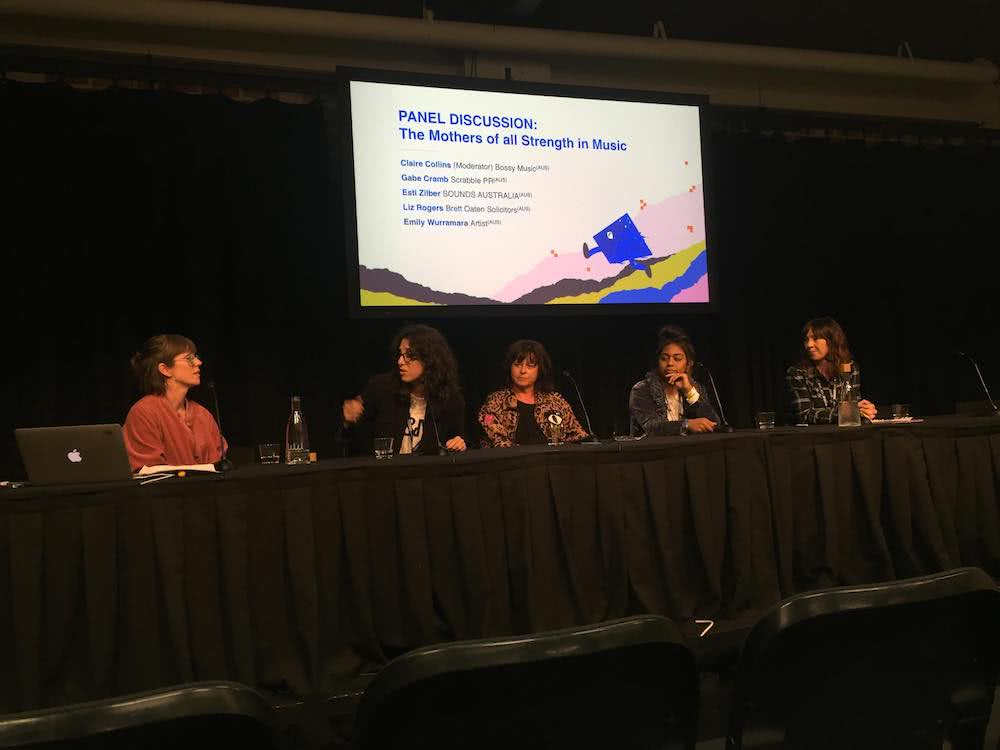The culture around working mothers in music needs to change

An important conversation was given a platform and a spark at BIGSOUND last week when five music industry figures, who are also mothers, delivered a panel titled The Mothers of All Strength In Music.
Of all public board members in the Australian music industry, just 35% of them were women (triple j’s Hack). What’s more, of all female staff at major labels in Australia, a shocking 3% are mothers. A coincidence? The panel moderated by Bossy Music director Claire Collins thought not.
Rumours of HR managers dismissing CVs of mothers, and swift redundancies following maternity leave are just two reasons why the conversation between Collins, Sounds Australia’s Esti Zilber, Brett Oaten Solicitors’ Liz Rogers, Scrabble PR’s Gabe Cramb, and artist Emily Wurramara was so pertinent.
Claire Collins confessed she planned her pregnancies around D.D Dumbo’s album cycles, Emily Wurramara recorded her debut LP Milyakburra during her pregnancy and was back onstage just three weeks after the birth of her daughter last Boxing Day, and Liz Rogers said she forwent sleep many times just to get her work done.
“Research has shown that if there’s a [workplace] policy that just favours new mothers, then they’re less likely to take up those policies,” said Collins. “Because they feel bad or guilty that not everyone is getting them. […] Those kind of policies need to be made available to everyone so the culture can really change.”

The Mothers of All Strength In Music panel at BIGSOUND 2018
Artist Emily Wurramara found out she was pregnant at age 21, and told the audience that while her team was supportive, there were some archetypal reactions from others.
“I had a lot of support around me […] but still I got the typical ‘Oh my god, what’s going to happen to your career?’ I was like, ‘I’m not going to die or anything!’”
The panelists used the platform to offer a positive narrative around working mothers in the industry. Claire Collins said there’s a few misconceptions about capacity, in the early years especially.
“In my experience the first three months, you’re tired, you’re kind of tied to your baby,” she said. “But then pretty quickly you get back to normal and there’s a huge amount of things you can do physically and mentally.”
Gabe Cramb, who’s best known as the PR guru behind Splendour In The Grass said: “I definitely think that when they’re really little you can be a lot more flexible.”
“It’s so much easier to go to gigs because they’re in bed at 7pm, so you’ve got the whole night,” Collins added.
Sounds Australia Associate Producer Esti Zilber said a support system is an important factor for work/life balance, noting the support of her colleagues Millie Millgate, Glenn Dickie and Dom Alessio, and that of her partner, Future Classic’s Dan Zilber, is crucial.
“After we had Jonah the first trip I was scheduled to take was to New York and again it was put to me by Millie, ‘Is this something that you’re interested in? Do you feel ready?’
“I had a sense that I was empowered, I could make these choices myself,” Zilber added. “Dad came along and was on 100% dad duty when I wasn’t feeding, and it was a really great experience.”
“[…] I still remember breastfeeding in front of Dean Ormston who’s now our CEO at APRA AMCOS and it was no big deal; that was part of it. It did not stop me from doing my job.”
Liz Rogers, solicitor at Brett Oaten Solicitors also has a partner who works in the music industry. She said finding flexibility is one of the keys to success as a working mother.
“I’ve just found flexibility in all the work that I do and I feel like that’s enabled me to be a good mother and also do great work because there’s not expectations of being in the office 60 hours a week.”
Rogers said parents are legally entitled to flexibility under the Fair Work Act but need to be proactive in requesting that flexibility from employers.
Unfortunately, most panelists agreed that the need to be organised and the rolling out of systems fell mainly on them, not their partners.
“I know why that happened,” admitted Zilber. “It was because when I was on maternity leave and I didn’t have anything else to worry about I did all that and it was with ease. And then you go back to work and you’ve already done it so you know what to do. I guess, in a lot of ways, they’re [partners] waiting to be asked.”
When an audience member asked for ‘life hacks’ for working mothers, Zilber encouraged her to ask for the help she needs.
“A lot of mothers aren’t particularly good at asking for the help that we need,” she said. “We think that we have to be seen as strong […] I think we can do it and I think we can do it well, but I think we do it best when we’re able to say when we need help.”
What was made clear throughout the panel was this: the music industry needs to normalise practices and strategies to support and retain working mothers. Whether this is through actively communicating benefits for pregnant and working mothers, or shifting the way the company operates, music companies need to assess their business models to undo some of the stigmas and change the statistics.
Check out the Australian Human Rights Commission’s Supporting working parents website which offers employees and employers tailored information on a range of workplace issues.
This article originally appeared on The Industry Observer, which is now part of The Music Network.


































